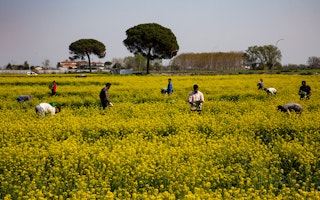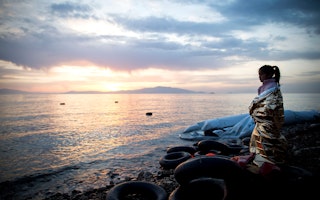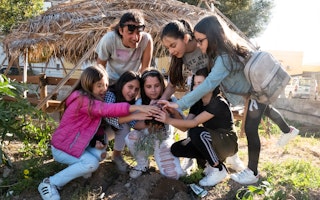Long Skeptical of Foreigners, Slovenia Struggles to Navigate the Refugee Crisis
By Klemen Ploštajner

When the first groups of refugees arrived at the Slovenian border on September 18, they were met by police, fences, and a complete lack of humanitarian aid or information. Those early days offered a preview for how the Slovenian government would ultimately deal with an influx of refugees eventually numbering in the tens of thousands.
Today, Slovenia has razor fences fortifying its southern border. The government passed new amendments to the Defense Law, giving the military broad powers over the civilian population. Racist hate speech permeates public discourse, and a state of paranoia prevails. These developments are a natural outgrowth of policies that treat foreigners as security threats.
Slovenia is a relatively young country. Formed in 1991 amid nationalistic fervor during the breakdown of Yugoslavia, its birth was marked by the elimination of more than 25,000 people, mostly foreign-born, from the country’s registry of permanent residence. Legislative exclusion of foreigners is thus written into the state apparatus—and reflected in the vanishingly small number of people to whom Slovenia has granted international protection. In the last 20 years, it has accepted only 391 asylum seekers.
Moreover, the integration of new arrivals into Slovene society is slow and inefficient. The Migrant Integration Policy Index, which combines 167 different indicators for eight different policy areas ranging from health to political participation, puts Slovenia far below the average score of all EU member states, right next to Hungary and Greece, neither of which are known for their stellar treatment of migrants.
From their arrival in Slovenia, asylum seekers are spatially isolated and structurally marginalized. Language courses are provided in asylum centers, but they’re not daily or customized for different educational backgrounds or countries of origin. In-depth language courses are provided only once a person has been granted asylum, but despite the native language being at the core of Slovene nationalist symbolism, the 300 hours of instruction provided by the state, with the possibility of an additional 100 hours, are often not enough. This creates a barrier to accessing education and the labor market, which, despite all the nationalist myths about migrating “others” stealing our jobs, heavily favors Slovene nationals.
Now the government is in the process of further limiting integration measures. Even though more integration measures are beneficial—not only for refugees themselves but for all of society—the new proposed version of the law on international protection further restricts the rights of asylum seekers and refugees. If accepted, it will cut allowances for refugees, constrict integration programs, establish quick courts for deportation, and further segregate refugees into special compounds. These kinds of policies will create a two-tiered society, with foreigners that scrape by with limited rights on one side and residents with full status on the other.
But things may be starting to change. As refugees have worked with solidarity groups to put collective pressure on the border regime, the gates of Fortress Slovenia are beginning to crack open.
Amid failed state policies, many citizens have taken the initiative to welcome the newly arrived, striving for inclusion—which emphasizes exchange and diversity—rather than integration. High school students are working to raise awareness of solidarity with migrants. Plays are being produced in collaboration with people usually marginalized in remote asylum centers. Dinners are being shared between those who represent different cultures.
These initiatives are small but gaining momentum, and are not only an effort to help the refugees, but an opportunity to improve society for all.
Klemen Ploštajner is a fellow with the Open Society Effective Activism Project.


